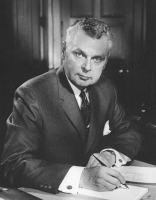| 出生地: | jiā ná dà 'ān dà lüè shěng niǔ sī tǎ | ||||||
| 去世地: | jiā ná dà 'ān dà lüè shěng wò tài huá | ||||||
| |||||||
约翰·乔治·迪芬贝克,PC,CH,QC(英语:John George Diefenbaker;1895年10月18日-1979年8月16日),德国人和苏格兰人后裔,是第13任加拿大总理,任内主要推动北方开发和减少对美国的依赖,恢复同英联邦国家的关系。他在1957年大选中加拿大进步保守党拥有下议院265个席次中的109席次,成为议院中的最大党,而首次成为执政党。他在75岁的前任总理,自由党领袖路易斯·圣劳伦特主动辞职下,就任总理。
生平
1895年,出生于加拿大萨斯喀彻温省。
1915年,毕业于萨斯喀彻温大学,获得文学学士学位。
1916年,获得政治学硕士学位。
1919年,获得法学学士学位,从事律师工作。
1936年,当选萨斯喀彻温省保守党领袖。
1940年,选入众议院。
1955年,当选为保守党领袖。
1956年,领导保守党赢得了大选。
1957年,出任总理,组成首届保守党政府。
1963年,辞去职务。
1979年,去世。
John George Diefenbaker PC CH QC FRSC FRSA (/ˈdiːfənˌbeɪkər/; September 18, 1895 – August 16, 1979) was the 13th prime minister of Canada from 1957 to 1963. Between 1930 and 1979, he was the only federal Progressive Conservative (PC or Tory) leader to lead the party to an election victory, doing so three times, although only once with a majority of seats in the House of Commons of Canada.
Diefenbaker was born in southwestern Ontario in the small town of Neustadt in 1895. In 1903, his family migrated west to the portion of the North-West Territories which would soon become the province of Saskatchewan. He grew up in the province and was interested in politics from a young age. After brief service in World War I, Diefenbaker became a noted criminal defence lawyer. He contested elections through the 1920s and 1930s with little success until he was finally elected to the House of Commons in 1940.
Diefenbaker was repeatedly a candidate for the PC leadership. He gained that party position in 1956, on his third attempt. In 1957, he led the Tories to their first electoral victory in 27 years; a year later he called a snap election and spearheaded them to one of their greatest triumphs. Diefenbaker appointed the first female minister in Canadian history to his Cabinet, as well as the first aboriginal member of the Senate. During his six years as Prime Minister, his government obtained passage of the Canadian Bill of Rights and granted the vote to the First Nations and Inuit peoples. In foreign policy, his stance against apartheid helped secure the departure of South Africa from the Commonwealth of Nations, but his indecision on whether to accept Bomarc nuclear missiles from the United States led to his government's downfall. Diefenbaker is also remembered for his role in the 1959 cancellation of the Avro Arrow project.
Factionalism returned in full force as the Progressive Conservatives fell from power in 1963, and while Diefenbaker's performance as Opposition Leader was heralded, his second loss at the polls prompted opponents within the party force him to a leadership convention in 1967. Diefenbaker stood for re-election as party leader at the last moment, but only attracted minimal support and withdrew. He remained an MP until his death in 1979, two months after Joe Clark became the first Tory Prime Minister since Diefenbaker.
| << 前一君主: lù yì · sī dì fēn · shèng luò lǎng | xiàn dài jiā ná dàyuē hàn · qiáo zhì · dí fēn bèi kè John George Diefenbaker (1957年~1963年) | 后一君主 >>: lāi sī tè · pí 'ěr xùn |
